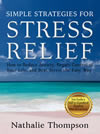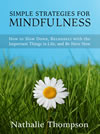 For a lot of us, stress has become a way of life, which is unfortunate because long term stress can have a lot of negative effects on both our minds and bodies. Fortunately, it is possible to learn coping strategies for stress that reduce your tension levels and increase your feelings of relaxation and peacefulness. It starts with accepting the fact that you are in control of your life and circumstances, and using that power to make positive changes for yourself and your own mental and physical health.
For a lot of us, stress has become a way of life, which is unfortunate because long term stress can have a lot of negative effects on both our minds and bodies. Fortunately, it is possible to learn coping strategies for stress that reduce your tension levels and increase your feelings of relaxation and peacefulness. It starts with accepting the fact that you are in control of your life and circumstances, and using that power to make positive changes for yourself and your own mental and physical health.
Reclaiming Your Own Power
The first thing to realize when it comes to coping strategies for stress is that no one can take away your stress except you. You need to accept responsibility for your own emotions and health. This is not blaming you for being stressed, this is helping you to understand where the real power always lies: within you.
When we assume that someone else’s action or inaction affects our stress levels (for example, “If Jane would just help out more, I wouldn’t be so stressed!”), we give away our power; this is the path that leads to depression and other mental health issues, so don’t give away your power! Accept responsibility for you own responses to the situations that surround you; claim your power and decide right now to take control of your life and be the change you want to see in your own life.
Not-So-Healthy Coping Strategies for Stress
The next step in exercising your power is to analyse your current coping strategies. How do you currently cope with stress? Do you have healthy coping strategies or not-so-healthy coping strategies?
Not-so-healthy strategies may seem quicker and less work to implement, and they may even feel like they’re helping in the short term, but in the long run they just compound the problem and make things worse. Take a look at the list below and make a note of any strategies that you currently use to deal with your stress levels.
- Smoking
- Self-medicating with drugs or alcohol
- Using prescription drugs to help you relax or sleep
- Overscheduling yourself to avoid thinking about things
- Lashing out at others with either words or physical violence
Most people will use at least one of these not-so-healthy strategies at some time or other, but if you find yourself using a lot of them, or resorting to them often, then it’s definitely time to re-evaluate your coping mechanisms and come up with healthier alternatives.
Healthy Coping Strategies for Stress
Fortunately, there are lots of healthy ways to deal with stress! Healthy coping strategies for stress are those that benefit you in the long run; these types of strategies help to increase your emotional and physical health and provide you with lasting solutions and mechanisms for coping with stress. Healthy coping strategies can be as simple as:
- Taking a walk
- Chatting with a friend
- Enjoying a bubble bath
- Listening to some relaxing music
- Taking the time to read a book
The most effective coping strategies for stress involve accepting responsibility for our own lives and our reactions to the events and circumstances therein; they involve reclaiming our power, and making the choice to create positive changes in our thoughts and habits.
In my next article, I’ll give you details on 24 coping strategies for stress that you can start putting to use in your life right away. All of the strategies discussed in the next article involve either changing the situation itself, or changing how you react to the stressor. But remember that, with any of those strategies, all the power to change resides with YOU! 🙂
photo credit: pixabay.com cc

















